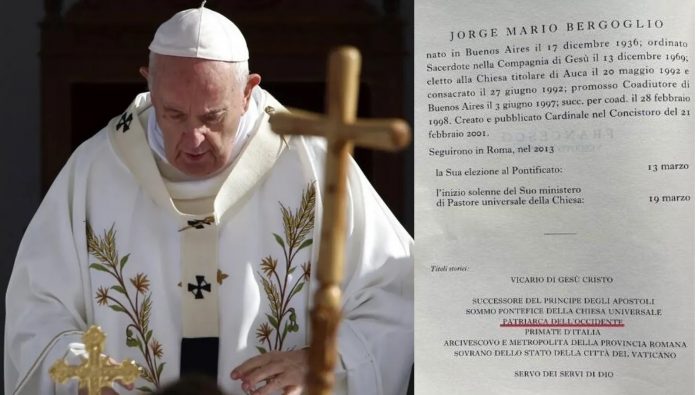Rome (Agenzia Fides) – In the Pontifical Yearbook 2024, published by the “Libreria Editrice Vaticana” (LEV), available since Tuesday April 9, appears on the page with the titles dedicated to Pope Francis, Bishop of Rome, also that of the “Patriarch of the West”.
This definition had disappeared from the list of papal honorary titles since 2006, following the order of Pope Benedict XVI. After this deletion, the Pontifical Council for Promoting Christian Unity, then headed by Cardinal Walter Kasper, issued a communiqué in which, among other things, it clarified that the title “Patriarch of the West” had been used in the year 642 by Pope Theodore I. The title later became established in the 16th and 17th centuries, “as part of the multiplication of papal titles,” as it was first stated in the Pontifical Yearbook in 1863.
The term “West”, the communiqué continued, “is not intended to describe an ecclesiastical territory, nor can it be used as a definition of a patriarchal territory.” Therefore, the title “Patriarch of the West” – the document continued – “would reflect the special relationship of the Bishop of Rome on this territory and could express the special jurisdiction of the Bishop of Rome for the Latin Church”. It was emphasized that the abolition of the title of Patriarch, which refers to the Bishop of Rome, does not mean the possibility of “new papal claims” in relation to the churches of the East, as had been suspected in some negative reactions from theologians and representatives of the Orthodox churches in the face of such an abolition: rather – it was affirmed – a “historical and theological realism” should be expressed which urgently requires the abolition of a title that is considered obsolete. Pope Francis’ decision to reinstate the title of “Patriarch of the West” can be linked to his insistence on the importance of synodality and ecumenical concern, which urges us to keep looking back to the first centuries of Christianity, when there were still no dogmatic disagreements between the churches.
The title “Patriarch of the West” also recalls in some way the experience of the First Christian Millennium, when the five seats of ancient Christianity (Rome, Constantinople, Alexandria, Antioch and Jerusalem), despite the differences in their respective histories and different spiritual accents, were of particular importance due to the bond that united them to the Apostolic Tradition.
The relationships of these five seats, in communion, appeared structured in the practice that Church history studies define as “Pentarchy”.
The five patriarchal sees – according to the historian Giorgio Morini – were also recognized by the imperial powers “as jointly responsible for the orthodoxy and leadership of the entire church.” At a time in history marked by the spread of conflicts that are pushing peoples to the brink of a third world war, ecumenical care sees the approach of the 1700th anniversary of the Council of Nicaea, held in 325 AD, as a favorable occasion. Christians have – as Pope Francis already emphasized on May 6, 2022 – have the opportunity to gather and celebrate together the 1,700 years since the Council of Nicaea, as if for a new beginning. Exactly in the year 2025, all Christians will, among other things, celebrate the Lord’s Easter for the first time on the same day, Sunday, April 20th. On March 31, Easter Sunday for the churches according to the Gregorian calendar, Bartholomew I, Ecumenical Patriarch of Constantinople, emphasized in an address that: “On this day, the universal message of the Resurrection becomes even more important, because our non- Orthodox Christian brothers and sisters celebrate today the Resurrection of our Lord from the dead, Holy Easter. We have already sent our representatives to all the Christian communities of other denominations present here to send them the festive greetings of the Holy Great Church of Christ and our patriarchal congratulations. But from here we also send a warm greeting of love to all Christians who are celebrating Easter today. We ask the Lord of glory that the common celebration of Easter that we will celebrate next year is not just a happy coincidence, a fortuitous event, but the beginning of the setting of a common date for the annual celebration by Eastern and Western Christianity. In his speech, Patriarch Bartholomew also referred to the 1700th anniversary of the convocation of the Ecumenical Council of Nicaea, “which, among other things, dealt with the issue of regulating the timing of the celebration of Easter. We are optimistic,” the Patriarch added, “because there is good will and willingness on both sides to do so. For in fact, it is a scandal to celebrate separately the unique event of the Resurrection of the One Lord”. (Agenzia Fides, 11/4/2024)

